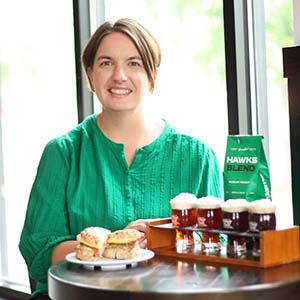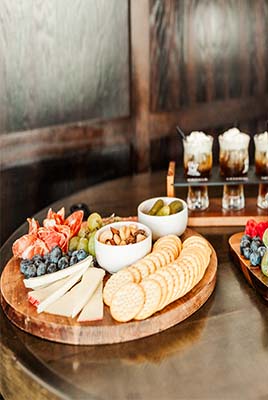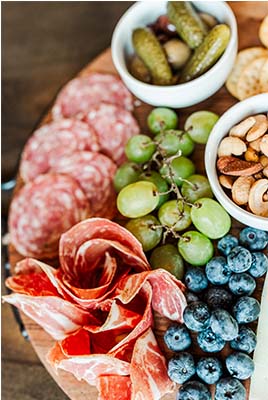Food Fandom: Researches Consumer Taste Perception

Dr. Jennifer Stoner
Jennifer Stoner got her start in the marketing world in her 4th grade classroom. Stoner’s father, John Stoner, worked on the marketing team for a Pennsylvania-based lawn & garden company. His company was conducting a focus group in her classroom for a product they were launching called Real Tools for Kids. These tools were smaller versions of actual tools, utilizing materials like wooden handles and a metal shovel head, rather than plastic.
“He came into my classroom and I thought it was super cool. My dad is a marketing guy so from a young age, I kind of knew marketing would be my career path,” says Stoner.
Now an Associate Professor & Paige Endowed Professor of Marketing at the University of North Dakota Nistler College of Business & Public Administration (UND NCoBPA) for nearly 8 years, Stoner is also an avid researcher in brand marketing.
“I love being in front of students in the classroom, but also like being able to do high quality research,” says Stoner. “Not a lot of Universities offer that balance, but the UND NCoBPA had the right balance of teaching and research for me.”
In addition to her personal research and teaching, Stoner is a member of UND’s marketing counsel and was a part of the branding sub-committee when the University launched their new marketing campaign: Leaders in Action.
“It was really cool to see what I was researching (brand marketing) in action, that was really fun,” says Stoner.
Food Fandom

Since 2015, Stoner has been working on a research project with a dear friend from grad school, Maria Rodas, an Assistant Professor of Marketing at the University of Illinois Urbana-Champaign. In April of 2023, Stoner & Roadas’ level 4 journal titled ‘Love is blind: the ironic effect of fans’ experience on taste perception’ was published in Marketing Letters. The A level 4 journal is the highest level/ accolade you can achieve as a professor and researcher at the UND NCoBPA.
According to Stoner, the two were initially interested in looking at how brands impact taste perceptions. Their initial hypothesis was that if people were engaging with a softer, warmer brand, it would make them think the taste was more subtle or not as strong.
Typically, marketing research is done with blind taste testing. Participants are not told what the brand is, it’s just given to them. Stoner & Rodas’ research suggested that was wrong, as people have a different taste perception if they have the branding info - from descriptions and brand names, to packaging.
“Equally interesting here is that marketing research has never looked at ‘fans’ as a group before,” says Stoner. “They have always looked at novices (people who know nothing about the product) or experts (people who have a lot of info about products).”
Stoner & Rodas consulted Stoner’s mother, an avid reader, on what to call these people who are not novices or experts, but somewhere in between. A group of people who really love a product, but may not have a lot of information about it such as how to properly taste the product, or how it is sourced. The women landed on food ‘fans.’
‘Fans’ Experience on Taste Perception

Stoner & Rodas first piloted their study with both mild and sharp cheddar cheese. They wanted to see if these participants, or ‘fans,’ could discern certain tastes. Each ‘fan’ was blindly given 2 cubes of one of the cheese varieties and asked to rank how strong it was, and to rank their liking for cheese.
The second cohort was conducted with coffee as the test product in UND’s Gamble Hall, home to the NCoBPA. Not knowing the best way to manipulate strong or weak coffee, Stoner reached out to Sandi Luck, the owner of Bully Brew Coffee in Grand Forks, N.D., and a former colleague of Stoner at the UND NCoBPA. Sandi was able to provide Stoner and Rodas with two different kinds of coffee: one being a dark roast with more coffee grounds to make it stronger, and a second a light roast with less coffee grounds. From there, the two women recruited anyone in the hallways within Gamble Hall - from students, to faculty & staff, and even community members - to participate. Each ‘fan’ was given a cup of coffee that was either strong or weak and rated that cup on strength and how much they generally liked coffee. Participants were entered into a raffle to win a coffee shop gift card.
The third and final study was conducted with chocolate at the University of Southern California, where Rodas was based at the time. In the first two studies, they utilized an unfamiliar brand description, but for this one, unfamiliar packaging was also tested – yielding the same results as the unfamiliar brand descriptions.
According to the article, Stoner & Rodas concluded that these fans’ love actually blinds them in their ability to report nuances about the products they consume because of the use of top-down information processing. However, when presented with novel brand information, fans switch to a more bottom-up approach which allows greater discernment of the consumption experience. Prompting mindful consumption can also impact a fan’s ability to report a product’s nuances more accurately.
“This is a project that could not have been done without a variety of facets at UND and the Grand Forks community coming together and helping out,” says Stoner.
Stoner is thankful for the support she received, especially from Dale Morrison, a UND alumnus Stoner had a fellowship with at the time. Stoner says she used the money from her Morrison fellowship to pay for both the coffee and the gift card for the participants to get the research done.
“I feel so thankful for his generosity offering this fellowship to me. Marketing research wants this interaction with real products, but you can’t do that without funding,” says Stoner.
The day after Stoner & Rodas’ journal was accepted, Stoner found out Dale Morrison, an active & generous alumnus who also hosted the UND NCoBPA’s annual Morrison Leadership Summit event, had passed away.
“He was always encouraging about the things I was doing. I always felt like he was behind me, supporting me,” says Stoner.
Though already published online, “Love is blind: the ironic effect of fans’ experience on taste Perception” is soon to be issued.